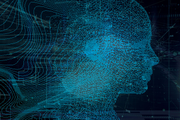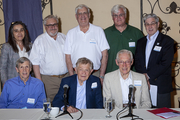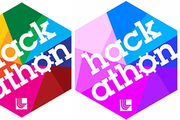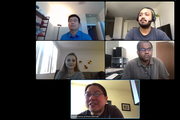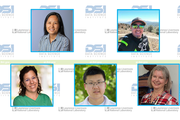Did you know we have a monthly newsletter? View past volumes and subscribe.
New HPC4EI project to create 'digital twin' models for aerospace manufacturing
Jan. 19, 2023 -
A partnership involving LLNL aimed at developing “digital twins” for producing aerospace components is one of six new projects funded under the HPC for Energy Innovation (HPC4EI) initiative, the Department of Energy’s Office of Energy Efficiency and Renewable Energy announced. Sponsored by the HPC4Manufacturing (HPC4Mfg) Program, one of the pillars of HPC4EI, the collaboration between LLNL...
Cognitive simulation supercharges scientific research
Jan. 10, 2023 -
Computer modeling has been essential to scientific research for more than half a century—since the advent of computers sufficiently powerful to handle modeling’s computational load. Models simulate natural phenomena to aid scientists in understanding their underlying principles. Yet, while the most complex models running on supercomputers may contain millions of lines of code and generate...
LLNL researchers win HPCwire award for applying cognitive simulation to ICF
Nov. 17, 2022 -
The high performance computing publication HPCwire announced LLNL as the winner of its Editor’s Choice award for Best Use of HPC in Energy for applying cognitive simulation (CogSim) methods to inertial confinement fusion (ICF) research. The award was presented at the largest supercomputing conference in the world: the 2022 International Conference for High Performance Computing, Networking...
Understanding the universe with applied statistics (VIDEO)
Nov. 17, 2022 -
In a new video posted to the Lab’s YouTube channel, statistician Amanda Muyskens describes MuyGPs, her team’s innovative and computationally efficient Gaussian Process hyperparameter estimation method for large data. The method has been applied to space-based image classification and released for open-source use in the Python package MuyGPyS. MuyGPs will help astronomers and astrophysicists...
Lab directors discuss LLNL’s past, present and future at ‘historic conversation’
Sept. 14, 2022 -
On a historic occasion in the Livermore wine country, the nine living LLNL directors gathered on Sept. 8 to mark the Laboratory’s 70th anniversary, share stories and discuss their vision for the Lab in the coming years. Hosted by the nonprofit Livermore Lab Foundation, the panel brought past directors John Foster Jr., John Nuckolls, Bruce Tarter, George Miller, Parney Albright, and Bill...
Celebrating 10 years of hackathons
Sept. 7, 2022 -
Hackathons are one of LLNL Computing’s most enduring and beloved traditions. Although some details have changed since the first hackathon, the premise remains the same: Participants have 24 hours to work on any project of their choosing, whether that’s learning a programming language, building a prototype, developing a new skill, or experimenting with a software framework. They are encouraged...
LLNL team claims top AI award at international symbolic regression competition
Aug. 16, 2022 -
An LLNL team claimed a top prize at an inaugural international symbolic regression competition for an artificial intelligence (AI) framework they developed capable of explaining and interpreting real-life COVID-19 data. Hosted by the open source SRBench project at the 2022 Genetic and Evolutionary Computation Conference (GECCO), the competition had two tracks—synthetic and real-world—and...
Lab researchers win top award for machine learning-based approach to ICF experiments
Aug. 4, 2022 -
The IEEE Nuclear and Plasma Sciences Society (NPSS) announced an LLNL team as the winner of its 2022 Transactions on Plasma Science Best Paper Award for their work applying machine learning to inertial confinement fusion (ICF) experiments. In the paper, lead author Kelli Humbird and co-authors propose a novel technique for calibrating ICF experiments by combining machine learning with...
An open-source, data-science toolkit for energy: GridDS
Aug. 2, 2022 -
As the number of smart meters and the demand for energy is expected to increase by 50% by 2050, so will the amount of data those smart meters produce. While energy standards have enabled large-scale data collection and storage, maximizing this data to mitigate costs and consumer demand has been an ongoing focus of energy research. An LLNL team has developed GridDS—an open-source, data-science...
Defending U.S. critical infrastructure from nation-state cyberattacks
July 21, 2022 -
For many years, LLNL has been conducting research on cybersecurity, as well as defending its systems and networks from cyberattacks. The Lab has developed an array of capabilities to detect and defend against cyberintruders targeting IT networks and worked with government agencies and private-sector partners to share its cybersecurity knowledge to the wider cyberdefense community. LLNL has...
Panel discussion spotlights COVID-19 R&D
July 19, 2022 -
The DSI’s career panel series continued on June 28 to highlight some of LLNL’s COVID-19 research projects. Three data scientists—Emilia Grzesiak, Derek Jones, and Priyadip Ray—joined moderator and data scientist Stewart He to talk about their work in drug screening, protein–drug compounds, antibody–antigen sequence analysis, and risk factor identification.
He, who earned a PhD in Computer...
Introduction to deep learning for image classification workshop (VIDEO)
July 6, 2022 -
In addition to its annual conference held every March, the global Women in Data Science (WiDS) organization hosts workshops and other activities year-round to inspire and educate data scientists worldwide, regardless of gender, and to support women in the field. On June 29, LLNL’s Cindy Gonzales led a WiDS Workshop titled “Introduction to Deep Learning for Image Classification.” The abstract...
Assured and robust…or bust
June 30, 2022 -
The consequences of a machine learning (ML) error that presents irrelevant advertisements to a group of social media users may seem relatively minor. However, this opacity, combined with the fact that ML systems are nascent and imperfect, makes trusting their accuracy difficult in mission-critical situations, such as recognizing life-or-death risks to military personnel or advancing materials...
CASC team wins best paper at visualization symposium
May 25, 2022 -
A research team from LLNL’s Center for Applied Scientific Computing won Best Paper at the 15th IEEE Pacific Visualization Symposium (PacificVis), which was held virtually on April 11–14. Computer scientists Harsh Bhatia, Peer-Timo Bremer, and Peter Lindstrom collaborated with University of Utah colleagues Duong Hoang, Nate Morrical, and Valerio Pascucci on “AMM: Adaptive Multilinear Meshes.”...
Kevin McLoughlin applies computational biology to complex problems
May 17, 2022 -
Kevin McLoughlin has always been fascinated by the intersection of computing and biology. His LLNL career encompasses award-winning microbial detection technology, a COVID-19 antiviral drug design pipeline, and work with the ATOM consortium. The appeal for him in these projects lies at the intersection of computing and biology. “I love finding ways to visualize data that reveal relationships...
Unprecedented multiscale model of protein behavior linked to cancer-causing mutations
Jan. 10, 2022 -
LLNL researchers and a multi-institutional team have developed a highly detailed, machine learning–backed multiscale model revealing the importance of lipids to the signaling dynamics of RAS, a family of proteins whose mutations are linked to numerous cancers. Published by the Proceedings of the National Academy of Sciences, the paper details the methodology behind the Multiscale Machine...
LLNL establishes AI Innovation Incubator to advance artificial intelligence for applied science
Dec. 20, 2021 -
LLNL has established the AI Innovation Incubator (AI3), a collaborative hub aimed at uniting experts in artificial intelligence (AI) from LLNL, industry and academia to advance AI for large-scale scientific and commercial applications. LLNL has entered into a new memoranda of understanding with Google, IBM and NVIDIA, with plans to use the incubator to facilitate discussions and form future...
Career panel spotlights diversity, equity, and inclusion
Nov. 19, 2021 -
The DSI’s career panel series continued on November 3 with a session highlighting diversity, equity, and inclusion (DEI) as well as the Lab’s DEI-focused employee resource groups (ERGs). ERGs are sponsored by LLNL’s Office of Strategic Diversity and Inclusion Programs.
Moderator Anh Quach, member of the Asian Pacific American Council (APAC), was joined by four panelists: Raul Viera Mercado...
Building confidence in materials modeling using statistics
Oct. 31, 2021 -
LLNL statisticians, computational modelers, and materials scientists have been developing a statistical framework for researchers to better assess the relationship between model uncertainties and experimental data. The Livermore-developed statistical framework is intended to assess sources of uncertainty in strength model input, recommend new experiments to reduce those sources of uncertainty...
Summer scholar develops data-driven approaches to key NIF diagnostics
Oct. 20, 2021 -
Su-Ann Chong's summer project, “A Data-Driven Approach Towards NIF Neutron Time-of-Flight Diagnostics Using Machine Learning and Bayesian Inference,” is aimed at presenting a different take on nToF diagnostics. Neutron time-of-flight diagnostics are an essential tool to diagnose the implosion dynamics of inertial confinement fusion experiments at NIF, the world’s largest and most energetic...


